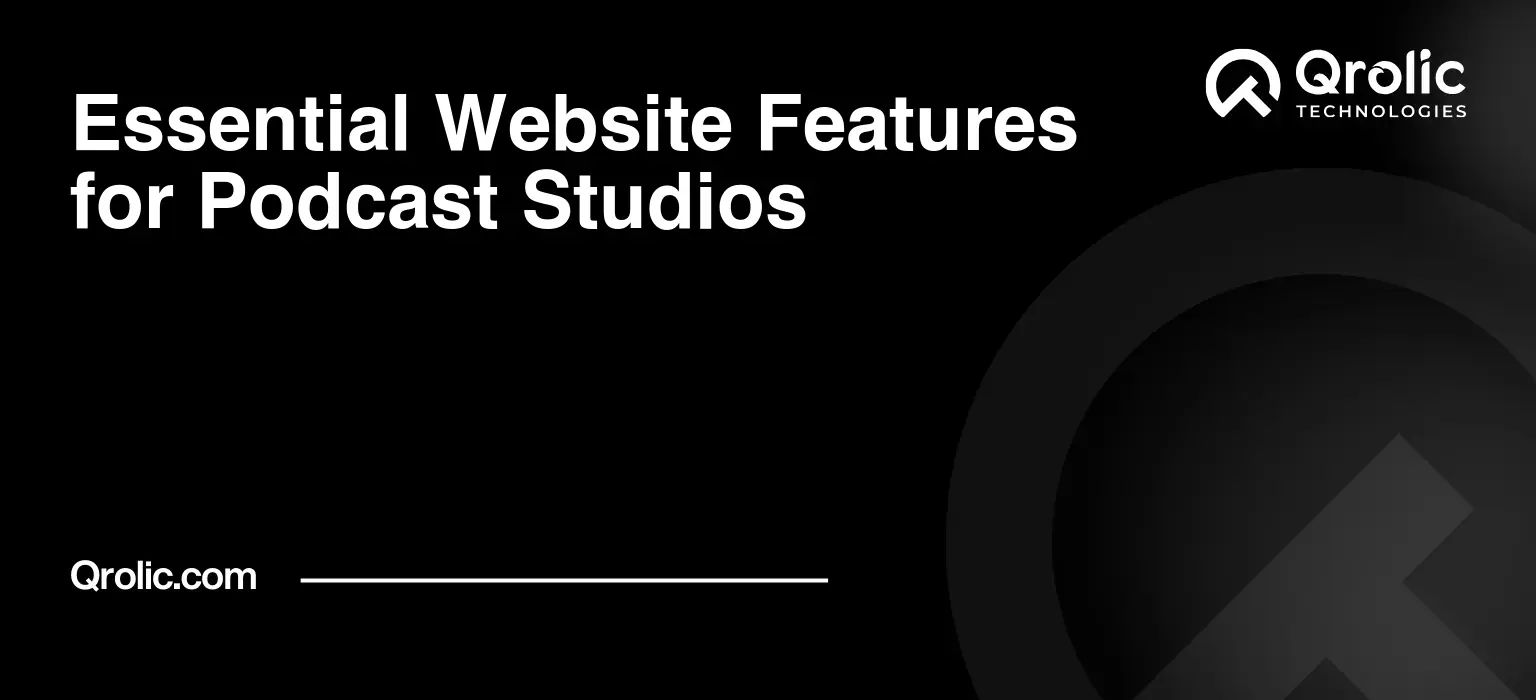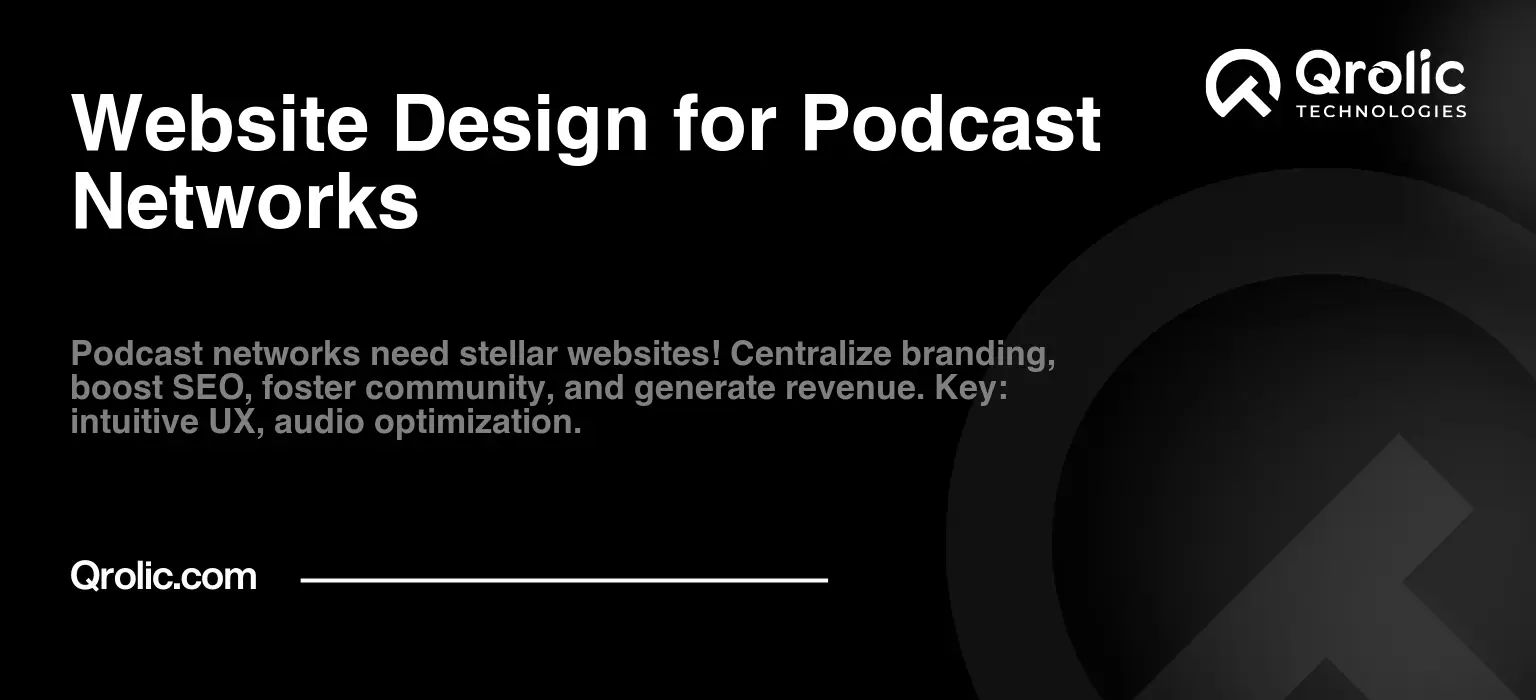Quick Summary:
- Your website is your studio’s essential online hub.
- Clearly showcase your services, episodes, and team.
- Optimize your site for speed, mobile, and search engines.
- Regularly update your website for ongoing success.
Table of Contents
- Why Your Podcast Studio Needs a Killer Website
- Benefits of a Well-Designed Podcast Studio Website
- Key Features Your Podcast Studio Website Needs
- 1. Episode Showcase: Let Your Work Speak for Itself
- Why an Episode Showcase Matters
- Essential Elements of an Episode Showcase
- Example:
- 2. Services Page: Clearly Define What You Offer
- Importance of a Detailed Services Page
- Key Services to Highlight
- Structuring Your Services Page
- Example: Podcast Editing Service Description
- 3. Subscription Options: Build a Loyal Following
- Why Offer Subscription Options?
- Types of Subscription Options
- Essential Elements of Subscription Forms
- Example:
- 4. About Us Page: Tell Your Story and Build Trust
- Why the “About Us” Page Matters
- Essential Elements of an “About Us” Page
- Tips for Writing a Compelling “About Us” Page
- Example:
- 5. Contact Page: Make It Easy to Get in Touch
- Why a Good Contact Page Matters
- Essential Elements of a Contact Page
- Tips for Designing an Effective Contact Page
- Example:
- 6. Blog: Share Your Expertise and Attract Traffic
- Why a Blog Matters
- Blog Post Ideas for Podcast Studios
- Tips for Writing Effective Blog Posts
- Example: Blog Post Title
- 7. Pricing Page (Optional but Recommended): Transparency Builds Trust
- Why a Pricing Page Matters
- Types of Pricing Models
- What to Include on Your Pricing Page
- Tips for Creating an Effective Pricing Page
- Example: Pricing Page Snippet
- 8. Testimonials and Case Studies: Social Proof Sells
- Why Testimonials and Case Studies Matter
- Types of Testimonials
- Elements of a Compelling Case Study
- Tips for Gathering Testimonials and Case Studies
- Example: Testimonial
- Important Technical Considerations for Your Podcast Studio Website
- 1. Mobile Responsiveness: Reach Your Audience on Any Device
- Why Mobile Responsiveness Matters
- Tips for Ensuring Mobile Responsiveness
- 2. SEO Optimization: Get Found by Potential Clients
- Key SEO Strategies for Podcast Studios
- 3. Fast Loading Speed: Keep Visitors Engaged
- Tips for Improving Website Loading Speed
- 4. Secure Socket Layer (SSL) Certificate: Protect Your Visitors’ Data
- Why SSL Certificates Matter
- 5. Easy-to-Use Content Management System (CMS): Maintain Your Website with Ease
- Popular CMS Options
- Don’t Forget: Website Maintenance and Updates
- Routine Maintenance Tasks
- Content Updates
- Qrolic Technologies: Your Partner in Building a Powerful Podcast Studio Website
- How Qrolic Technologies Can Help
- Our Approach
- Let’s Build Your Dream Website
- Conclusion: Invest in Your Website, Invest in Your Success
Why Your Podcast Studio Needs a Killer Website
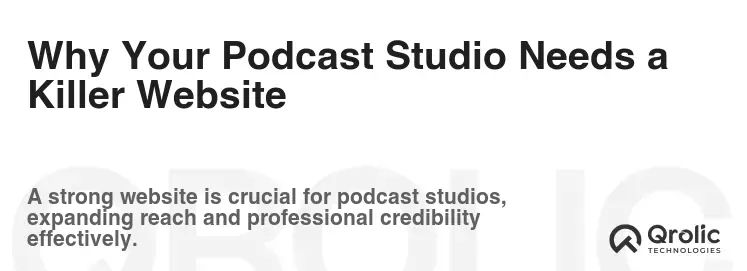
Podcasting is booming. Everyone, it seems, has a podcast idea, and many are launching studios to bring those ideas to life. But having great equipment and a passion for audio isn’t enough. You need a central hub, a digital storefront, a place to connect with potential clients and showcase your expertise. That’s where a killer website comes in. Think of your website as the beating heart of your podcast studio. It’s where potential clients will:
- Discover your services.
- Evaluate your capabilities.
- Contact you to book studio time or production services.
Without a compelling and functional website, you’re missing out on valuable opportunities to grow your business and establish yourself as a leader in the podcasting world. It’s not just about having any website; it’s about having one that’s specifically tailored to the unique needs of a podcast studio.
Benefits of a Well-Designed Podcast Studio Website
A well-designed website isn’t just a pretty face; it’s a strategic tool that can drive significant benefits for your podcast studio:
- Increased Visibility: A website allows you to reach a wider audience through search engines like Google. Potential clients searching for “podcast studio near me” or “podcast editing services” can find you easily.
- Enhanced Credibility: A professional website instantly boosts your studio’s credibility. It shows you’re serious about your business and committed to providing high-quality services.
- Lead Generation: Your website can be a lead generation machine. Through contact forms, booking calendars, and downloadable resources, you can capture valuable leads and nurture them into paying clients.
- Showcase Your Expertise: Your website provides a platform to showcase your studio’s capabilities, equipment, and past projects. This helps potential clients understand your strengths and make informed decisions.
- Improved Client Communication: A website can streamline client communication through FAQs, online booking systems, and dedicated client portals. This saves you time and improves client satisfaction.
- Branding and Identity: Your website is an extension of your brand. It allows you to communicate your unique values, personality, and style, helping you stand out from the competition.
Key Features Your Podcast Studio Website Needs
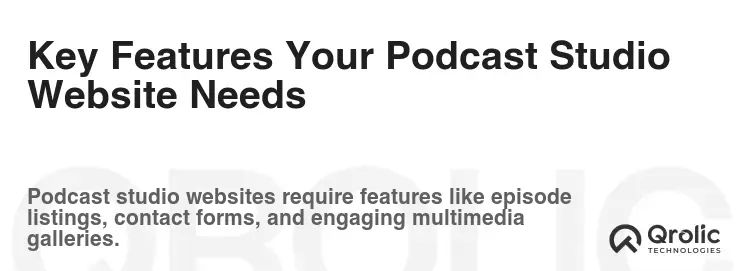
Let’s dive into the essential features that will make your podcast studio website a powerful asset:
1. Episode Showcase: Let Your Work Speak for Itself
The core of your podcast studio is, well, the podcasts! Your website needs a prominent and engaging way to showcase the episodes you’ve helped create. This isn’t just about listing titles; it’s about creating an immersive experience that draws visitors in.
Why an Episode Showcase Matters
- Demonstrates Your Capabilities: Showing off your best work is the most effective way to prove your studio’s expertise.
- Attracts New Clients: Potential clients can get a feel for your studio’s style and quality by listening to episodes you’ve produced.
- Provides Social Proof: Featuring successful podcasts builds trust and credibility.
Essential Elements of an Episode Showcase
- High-Quality Audio Player: A seamless and reliable audio player is essential for allowing visitors to listen to episodes directly on your website. Look for players that are mobile-friendly and offer features like playback speed control.
- Compelling Episode Summaries: Don’t just list titles. Write engaging summaries that highlight the key themes, guests, and takeaways of each episode.
- Eye-Catching Visuals: Use attractive cover art and relevant images to draw attention to each episode.
- Clear Call to Action: Encourage visitors to listen to the full episode on their preferred podcast platform (Apple Podcasts, Spotify, Google Podcasts, etc.). Include links to these platforms.
- Categorization and Filtering: If you work with a variety of podcast genres or topics, allow visitors to filter episodes by category.
- Client Testimonials: Include quotes from satisfied clients about their experience working with your studio on specific episodes.
- SEO Optimization: Optimize each episode page with relevant keywords to improve search engine visibility. Include keywords in the title, summary, and image alt text.
Example:
Imagine a podcast studio specializing in true crime podcasts. Their episode showcase might feature:
- Episode Title: “The Mystery of the Missing Millionaire”
- Summary: “Dive into the chilling tale of a wealthy entrepreneur who vanished without a trace. We explore the suspects, the evidence, and the unanswered questions that continue to haunt investigators.”
- Visual: A dramatic image related to the case.
- Call to Action: “Listen on Apple Podcasts,” “Listen on Spotify,” “Learn More About Our Podcast Production Services”
2. Services Page: Clearly Define What You Offer
Your website’s services page is where you explicitly outline the range of services your podcast studio provides. Clarity and detail are crucial here. Potential clients need to understand exactly what you offer and how you can help them achieve their podcasting goals.
Importance of a Detailed Services Page
- Sets Expectations: Clearly defining your services helps manage client expectations and ensures everyone is on the same page.
- Attracts the Right Clients: By specifying your areas of expertise, you can attract clients who are a good fit for your studio.
- Facilitates the Sales Process: A well-written services page can answer many of potential clients’ initial questions, making the sales process smoother and more efficient.
Key Services to Highlight
- Podcast Recording: Describe your studio’s recording facilities, equipment, and expertise in capturing high-quality audio.
- Podcast Editing: Explain your editing process, including noise reduction, audio balancing, and adding music and sound effects.
- Podcast Mixing and Mastering: Detail your mixing and mastering services, which ensure a polished and professional final product.
- Podcast Production: Offer comprehensive podcast production packages that cover all aspects of the process, from concept development to distribution.
- Podcast Consulting: Provide consulting services to help clients develop their podcast ideas, strategies, and marketing plans.
- Voiceover Services: If your studio has voiceover talent, highlight this service and showcase voiceover demos.
- Sound Design: Offer sound design services to create immersive and engaging audio experiences.
- Podcast Launch Support: Help clients launch their podcasts on various platforms and develop marketing strategies.
- Video Podcast Production: If you offer video podcasting services, detail your capabilities in video recording, editing, and production.
Structuring Your Services Page
- Clear Headings and Subheadings: Use clear and concise headings to organize your services and make it easy for visitors to find the information they need.
- Detailed Descriptions: Provide detailed descriptions of each service, including the benefits and features.
- Pricing Information: If possible, include pricing information for your services. This can help potential clients budget and make informed decisions. If pricing is complex, offer a “Request a Quote” option.
- Portfolio Examples: Showcase examples of your work related to each service.
- Call to Action: Encourage visitors to contact you to learn more about your services or book a consultation.
- Frequently Asked Questions (FAQs): Address common questions about your services on your FAQ page.
Example: Podcast Editing Service Description
Podcast Editing:
- Description: “Our podcast editing service transforms raw audio into polished, professional-sounding episodes. We meticulously remove unwanted noises, balance audio levels, and seamlessly integrate music and sound effects. We use industry-standard software and techniques to ensure your podcast sounds its best.”
- Benefits: “Improved audio quality, enhanced listener experience, reduced background noise, consistent audio levels, professional sound.”
- Process: “1. Upload your raw audio files. 2. We edit and enhance the audio. 3. We send you a preview for review. 4. We finalize the episode based on your feedback.”
3. Subscription Options: Build a Loyal Following
While you’re primarily offering services to create podcasts, having a subscription option can be valuable for sharing insights, behind-the-scenes content, or exclusive resources related to podcasting. This fosters a community and positions you as an authority in the field.
Why Offer Subscription Options?
- Establishes Thought Leadership: Sharing your expertise through a newsletter or members-only content builds trust and credibility.
- Nurtures Leads: Subscriptions allow you to stay in touch with potential clients and nurture them over time.
- Generates Revenue (Potentially): You could offer paid subscriptions for premium content or resources.
Types of Subscription Options
- Email Newsletter: A regular email newsletter with podcasting tips, industry news, and updates from your studio.
- Blog Subscription: Allow visitors to subscribe to your blog to receive updates whenever you publish a new article.
- Members-Only Content: Offer exclusive content, such as webinars, tutorials, or templates, to paying subscribers.
- Podcasting Community: Create a private online community where subscribers can connect with each other and learn from your team.
Essential Elements of Subscription Forms
- Clear Value Proposition: Explain the benefits of subscribing and what subscribers can expect to receive.
- Easy Signup Process: Make it easy for visitors to subscribe by using a simple and intuitive signup form.
- Privacy Policy: Clearly state how you will use subscribers’ email addresses and protect their privacy.
- Unsubscribe Option: Provide a clear and easy-to-find unsubscribe option in all emails.
- Segmentation: Segment your subscribers based on their interests and needs so you can send them relevant content.
Example:
Headline: “Unlock the Secrets to Podcast Success!”
Body: “Subscribe to our newsletter and get exclusive podcasting tips, industry insights, and behind-the-scenes updates from our studio. Learn how to create engaging content, grow your audience, and monetize your podcast.”
Form Fields: “Name,” “Email Address,” “I am interested in: [ ] Starting a Podcast [ ] Improving my Existing Podcast [ ] Podcast Editing Services”
4. About Us Page: Tell Your Story and Build Trust
The “About Us” page is your opportunity to connect with potential clients on a personal level. It’s where you tell your story, share your values, and build trust. Don’t treat this page as an afterthought; it’s a critical part of your website.
Why the “About Us” Page Matters
- Builds Trust and Credibility: Sharing your story and values helps potential clients connect with you and trust your expertise.
- Differentiates Your Studio: Your “About Us” page is an opportunity to showcase what makes your studio unique and stand out from the competition.
- Attracts the Right Clients: By communicating your values and approach, you can attract clients who are a good fit for your studio.
Essential Elements of an “About Us” Page
- Your Studio’s Story: Share the story of how your studio was founded, your mission, and your vision for the future.
- Your Team: Introduce your team members and highlight their skills, experience, and passion for podcasting. Include photos of your team.
- Your Values: Clearly communicate your studio’s values, such as quality, creativity, collaboration, and customer satisfaction.
- Your Approach: Explain your unique approach to podcast production and how you help clients achieve their goals.
- Your Clients: Showcase testimonials and case studies from satisfied clients.
- Your Location: Include your studio’s location and contact information.
- Call to Action: Encourage visitors to contact you to learn more about your studio or book a consultation.
Tips for Writing a Compelling “About Us” Page
- Be Authentic: Write in your own voice and be genuine.
- Focus on the Reader: Explain how your studio can help potential clients achieve their podcasting goals.
- Use Visuals: Include photos and videos to make your “About Us” page more engaging.
- Keep it Concise: Avoid rambling and get straight to the point.
- Proofread Carefully: Ensure your “About Us” page is free of errors.
Example:
“At [Studio Name], we’re more than just a podcast studio; we’re a team of passionate audio storytellers. Founded by [Founder Name], a lifelong podcast enthusiast, our studio was born out of a desire to help others share their voices with the world. We believe that everyone has a story to tell, and we’re dedicated to providing the tools and expertise to help you tell it in the most compelling way possible.”
5. Contact Page: Make It Easy to Get in Touch
Your contact page is a crucial element of your website. It should be easy to find and provide visitors with all the information they need to get in touch with you. A well-designed contact page can significantly increase the number of leads you generate.
Why a Good Contact Page Matters
- Facilitates Communication: A contact page makes it easy for potential clients to get in touch with you and ask questions.
- Generates Leads: A contact form can capture valuable leads and help you grow your business.
- Provides Information: A contact page provides essential information, such as your address, phone number, and email address.
Essential Elements of a Contact Page
- Contact Form: Include a contact form with fields for name, email address, phone number (optional), and message.
- Email Address: Display your email address clearly and prominently.
- Phone Number: Include your phone number if you’re comfortable receiving phone calls.
- Address: Include your studio’s address if you have a physical location.
- Social Media Links: Link to your social media profiles.
- Map: Embed a map of your studio’s location.
- Business Hours: Display your business hours.
- Call to Action: Encourage visitors to contact you with any questions or inquiries.
Tips for Designing an Effective Contact Page
- Keep it Simple: Avoid clutter and make it easy for visitors to find the information they need.
- Use a Clear Call to Action: Tell visitors what you want them to do (e.g., “Contact us today for a free consultation”).
- Make it Mobile-Friendly: Ensure your contact page is responsive and looks good on all devices.
- Test Your Form: Test your contact form regularly to ensure it’s working properly.
- Respond Quickly: Respond to inquiries promptly and professionally.
Example:
Headline: “Get in Touch with Us”
Body: “We’d love to hear from you! Whether you have a question about our services, want to book a consultation, or just want to say hello, please don’t hesitate to contact us.”
Contact Form: (Fields for Name, Email, Phone, Message)
Email: info@[yourdomain].com
Phone: (555) 123-4567
Address: 123 Main Street, Anytown, USA
6. Blog: Share Your Expertise and Attract Traffic
A blog is a powerful tool for attracting traffic to your website, establishing your studio as an authority in the podcasting industry, and nurturing leads. Regular blog posts can significantly improve your website’s search engine ranking.
Why a Blog Matters
- Attracts Traffic: Blog posts optimized for relevant keywords can attract visitors from search engines.
- Establishes Authority: Sharing your expertise through blog posts builds trust and credibility.
- Nurtures Leads: Blog posts can provide valuable information that helps potential clients make informed decisions.
- Drives Social Media Engagement: Blog posts can be shared on social media, driving even more traffic to your website.
Blog Post Ideas for Podcast Studios
- “How to Start a Podcast” Guides: Provide step-by-step guides on how to start a podcast.
- Podcast Editing Tips: Share tips and tricks for editing audio and creating professional-sounding podcasts.
- Podcast Marketing Strategies: Offer advice on how to market a podcast and grow an audience.
- Interviews with Podcasters: Interview successful podcasters and share their insights and experiences.
- Behind-the-Scenes Looks: Give readers a behind-the-scenes look at your studio and your podcast production process.
- Industry News and Trends: Share news and trends related to the podcasting industry.
- Case Studies: Showcase successful podcast projects you’ve worked on.
- Equipment Reviews: Review podcasting equipment, such as microphones, headphones, and recording software.
Tips for Writing Effective Blog Posts
- Choose Relevant Topics: Write about topics that are of interest to your target audience.
- Conduct Keyword Research: Use keyword research tools to identify relevant keywords to target in your blog posts.
- Write Engaging Content: Write in a clear, concise, and engaging style.
- Use Visuals: Include images and videos to make your blog posts more visually appealing.
- Optimize for SEO: Optimize your blog posts for search engines by using relevant keywords in the title, headings, and body text.
- Promote Your Blog Posts: Share your blog posts on social media and in your email newsletter.
- Be Consistent: Publish new blog posts regularly to keep your audience engaged.
Example: Blog Post Title
“5 Essential Microphone Techniques for Recording Professional-Sounding Podcasts”
7. Pricing Page (Optional but Recommended): Transparency Builds Trust
While some studios prefer to provide custom quotes, a pricing page can be beneficial for potential clients who want a general idea of your costs. Transparency can build trust and save time by pre-qualifying leads.
Why a Pricing Page Matters
- Transparency: Provides potential clients with a clear understanding of your pricing structure.
- Pre-Qualifies Leads: Helps potential clients determine if your services are within their budget.
- Saves Time: Reduces the number of inquiries from clients who are not a good fit for your studio.
Types of Pricing Models
- Hourly Rates: Charge an hourly rate for studio time or specific services.
- Project-Based Pricing: Quote a fixed price for a specific project, such as editing a podcast episode.
- Package Pricing: Offer packages that include a bundle of services at a discounted price.
- Subscription Pricing: Offer subscription plans that provide access to a range of services for a monthly fee.
What to Include on Your Pricing Page
- Clear Pricing Information: Clearly state your pricing for each service or package.
- Detailed Descriptions: Provide detailed descriptions of what’s included in each service or package.
- Terms and Conditions: Clearly outline your terms and conditions, such as payment terms and cancellation policies.
- Custom Quote Option: Offer a “Request a Quote” option for clients who need a custom pricing proposal.
- Examples: Show examples of work performed and the cost associated with it.
Tips for Creating an Effective Pricing Page
- Be Transparent: Be upfront and honest about your pricing.
- Keep it Simple: Make your pricing easy to understand.
- Highlight Value: Emphasize the value of your services and the benefits of working with your studio.
- Use a Call to Action: Encourage visitors to contact you to learn more about your pricing or request a quote.
Example: Pricing Page Snippet
Podcast Editing:
- Basic Editing: $50 per episode (Includes noise reduction and audio balancing)
- Advanced Editing: $100 per episode (Includes basic editing, music integration, and sound effects)
8. Testimonials and Case Studies: Social Proof Sells
Testimonials and case studies are powerful forms of social proof that can significantly influence potential clients’ decisions. Showcasing positive feedback from satisfied clients can build trust and credibility.
Why Testimonials and Case Studies Matter
- Builds Trust: Testimonials and case studies provide evidence that your studio delivers on its promises.
- Demonstrates Value: They showcase the tangible benefits of working with your studio.
- Influences Decisions: They can help potential clients make informed decisions by providing real-world examples of your work.
Types of Testimonials
- Written Testimonials: Quotes from satisfied clients about their experience working with your studio.
- Video Testimonials: Video recordings of clients sharing their positive feedback.
- Social Media Testimonials: Positive comments and reviews on social media platforms.
Elements of a Compelling Case Study
- Client Background: Describe the client and their podcasting goals.
- Challenge: Outline the challenges the client faced.
- Solution: Explain how your studio helped the client overcome those challenges.
- Results: Quantify the results of your work, such as increased listenership or improved audio quality.
- Testimonial: Include a quote from the client about their experience working with your studio.
Tips for Gathering Testimonials and Case Studies
- Ask for Feedback: Regularly ask clients for feedback about their experience working with your studio.
- Make it Easy: Make it easy for clients to provide testimonials by providing a template or questionnaire.
- Offer Incentives: Offer incentives, such as discounts or free services, in exchange for testimonials.
- Follow Up: Follow up with clients after they’ve completed a project to gather feedback and request a testimonial.
Example: Testimonial
“Working with [Studio Name] was a game-changer for my podcast. They took my raw audio and transformed it into a polished, professional-sounding product. I highly recommend them!” – John Smith, Host of “The Tech Talk Podcast”
Important Technical Considerations for Your Podcast Studio Website
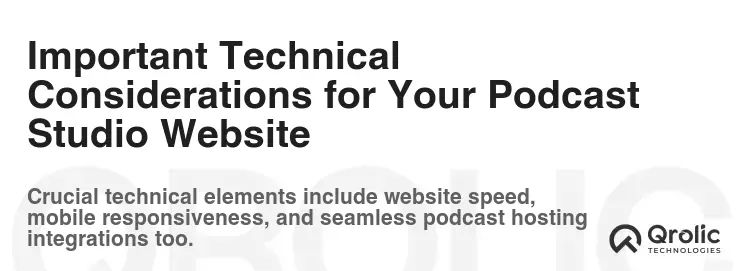
Beyond the specific features, certain technical aspects are vital for a successful podcast studio website. These impact user experience, SEO, and overall effectiveness.
1. Mobile Responsiveness: Reach Your Audience on Any Device
In today’s mobile-first world, it’s crucial to ensure your website is fully responsive and looks great on all devices, from smartphones to tablets to desktops.
Why Mobile Responsiveness Matters
- Improved User Experience: A responsive website provides a seamless user experience on all devices.
- Increased Traffic: Mobile devices account for a significant portion of web traffic.
- SEO Benefits: Google favors mobile-friendly websites in its search rankings.
Tips for Ensuring Mobile Responsiveness
- Use a Responsive Theme: Choose a website theme that is designed to be responsive.
- Test on Different Devices: Test your website on different devices to ensure it looks good and functions properly.
- Optimize Images: Optimize images for mobile devices to reduce loading times.
- Use Mobile-Friendly Navigation: Use a mobile-friendly navigation menu that is easy to use on small screens.
2. SEO Optimization: Get Found by Potential Clients
Search engine optimization (SEO) is the process of optimizing your website to rank higher in search engine results pages (SERPs). This is crucial for attracting organic traffic and reaching potential clients who are searching for podcast studio services online.
Key SEO Strategies for Podcast Studios
- Keyword Research: Identify relevant keywords that potential clients are using to search for podcast studio services.
- On-Page Optimization: Optimize your website’s content, titles, and meta descriptions with relevant keywords.
- Link Building: Build high-quality backlinks from other websites to improve your website’s authority.
- Content Marketing: Create valuable and engaging content, such as blog posts and articles, to attract traffic and build brand awareness.
- Local SEO: Optimize your website for local search to attract clients in your geographic area.
3. Fast Loading Speed: Keep Visitors Engaged
Website loading speed is a critical factor in user experience and SEO. A slow-loading website can frustrate visitors and cause them to leave, while a fast-loading website can improve engagement and conversion rates.
Tips for Improving Website Loading Speed
- Optimize Images: Optimize images for the web by reducing their file size without sacrificing quality.
- Use a Content Delivery Network (CDN): Use a CDN to distribute your website’s content across multiple servers, reducing loading times for users around the world.
- Minimize HTTP Requests: Reduce the number of HTTP requests your website makes by combining files and using CSS sprites.
- Enable Browser Caching: Enable browser caching to allow visitors’ browsers to store static assets, reducing loading times on subsequent visits.
- Choose a Fast Web Hosting Provider: Choose a web hosting provider that offers fast and reliable hosting services.
4. Secure Socket Layer (SSL) Certificate: Protect Your Visitors’ Data
An SSL certificate is a digital certificate that encrypts communication between your website and visitors’ browsers. This is crucial for protecting sensitive information, such as login credentials and credit card numbers.
Why SSL Certificates Matter
- Security: Protects visitors’ data from being intercepted by hackers.
- Trust: Shows visitors that your website is secure and trustworthy.
- SEO Benefits: Google favors websites with SSL certificates in its search rankings.
5. Easy-to-Use Content Management System (CMS): Maintain Your Website with Ease
A content management system (CMS) is a software application that allows you to create, manage, and publish content on your website without requiring any coding knowledge.
Popular CMS Options
- WordPress: A popular and versatile CMS that is easy to use and offers a wide range of themes and plugins.
- Squarespace: A user-friendly website builder that is ideal for small businesses.
- Wix: Another popular website builder that offers a drag-and-drop interface.
Don’t Forget: Website Maintenance and Updates
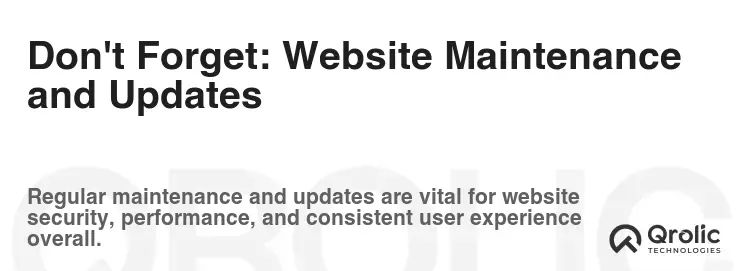
Your website is not a “set it and forget it” project. Regular maintenance and updates are essential to ensure it remains secure, functional, and effective.
Routine Maintenance Tasks
- Software Updates: Keep your CMS, themes, and plugins up to date to patch security vulnerabilities and improve performance.
- Backup Your Website: Regularly back up your website to protect your data from loss or corruption.
- Monitor Website Performance: Monitor your website’s performance, including loading speed and uptime, to identify and address any issues.
- Check for Broken Links: Regularly check for broken links and fix them to improve user experience and SEO.
Content Updates
- Keep Your Content Fresh: Regularly update your website’s content to keep it fresh and relevant.
- Add New Blog Posts: Publish new blog posts regularly to attract traffic and build brand awareness.
- Update Your Portfolio: Showcase your latest podcast projects in your portfolio.
Qrolic Technologies: Your Partner in Building a Powerful Podcast Studio Website
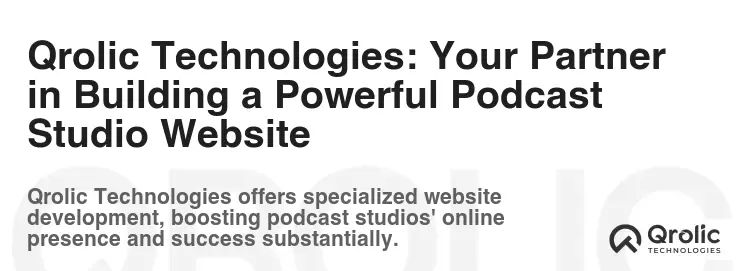
At Qrolic Technologies (https://qrolic.com/), we understand the unique needs of podcast studios. We specialize in creating custom website solutions that are designed to attract clients, showcase your expertise, and grow your business.
How Qrolic Technologies Can Help
- Custom Website Design: We create visually stunning and user-friendly websites that reflect your brand and style.
- SEO Optimization: We optimize your website for search engines to attract organic traffic and reach potential clients.
- Content Management Systems: We build websites on popular CMS platforms like wordpress, making it easy for you to manage your content.
- Mobile Responsiveness: We ensure your website is fully responsive and looks great on all devices.
- Website Maintenance: We offer ongoing website maintenance services to keep your website secure, functional, and up-to-date.
Our Approach
We work closely with our clients to understand their specific needs and goals. We then develop a custom website solution that is tailored to their unique requirements. Our team of experienced designers, developers, and SEO experts is dedicated to providing exceptional service and delivering results.
Let’s Build Your Dream Website
Contact Qrolic Technologies today to discuss your podcast studio website needs. We’re confident that we can help you create a powerful online presence that drives business growth.
Conclusion: Invest in Your Website, Invest in Your Success
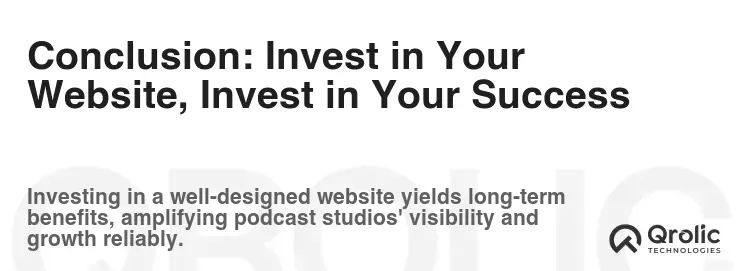
In the competitive world of podcasting, a well-designed and functional website is no longer optional; it’s essential. By implementing the features and strategies outlined in this article, you can create a website that attracts clients, showcases your expertise, and helps your podcast studio thrive. Don’t underestimate the power of a strong online presence. Invest in your website, and you’ll be investing in the future success of your podcast studio. Now is the time to take action and create a website that sets you apart from the competition.
